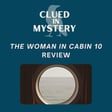Introduction to Clued in Mystery Podcast
00:00:10
Speaker
Welcome to Clued in Mystery. I'm Sarah. And I'm Brooke. And we both love mystery. Before we get started today, I have another podcast I'd like to recommend to our mystery-loving listeners. It's called Mystery Rats Maze Podcast by Kings River Life. Their episodes consist of mystery short stories and first chapters of mystery novels read and brought to life by professional narrators and actors.
00:00:40
Speaker
I've listened to a few episodes already and have grown my ever expanding TBR list. You can find Mystery Rats Maze podcast on all your favorite apps or on their website, which is mysteryratsmaze.podbean.com and we'll list that in our show notes.
Spotlight on Dorothy L Sayers
00:01:00
Speaker
Brooke, today we're going to talk about Dorothy L Sayers and I'm really looking forward to this.
00:01:05
Speaker
I know I am too. I feel like a broken record. I had so much to learn once again. And it was a really fun time learning more about this other pioneer of the mystery genre. And I mean, I feel like I could have spent even longer learning about her. There just seems to be so much.
00:01:25
Speaker
to her, and I feel like, I mean, we'll talk about her, but as with Christy and Doyle, we're really just going to scratch the surface of her personality and her writing, I think. But let's get started. For sure. Dorothy Lee Sayers was an only child born in 1893 in Oxford, England.
00:01:45
Speaker
She attended a boarding school in Salisbury and went on to graduate in 1915 with first-class honours from Somerville College, Oxford University, where she studied modern languages and medieval literature. Although at the time she finished, women weren't granted degrees, she was awarded one a few years later when the university changed its policy.
00:02:03
Speaker
In 1916, Blackwell Publishing published Sarah's first book of poetry and would go on to publish another in 1918. She actually ended up working for Blackwell for a period of time. In addition to her experience in publishing, she also worked in advertising and is credited with famous campaigns for Guinness Beer and Coleman Mustard. And it was during this time that Whose Body was published, which is the first of 14 novels and stories featuring Lord Peter Whimsy as a sleuth.
Sayers' Transition Beyond Mysteries
00:02:29
Speaker
When she finished the Whimsy series, she turned to writing plays and writing works with more religious theme, including translating Dante, which was a passion for her and what she considered to actually be her best work. In total, she published 16 novels, 10 plays, 6 translations, and 24 non-fiction works.
00:02:46
Speaker
Her father was a Reverend in the Church of England and I think it's that she grew up in religious circles that really influenced her writing religious works. I found reference to her being offered an honorary doctorate of divinity that she actually declined because, you know, she didn't feel like she had enough to warrant that. In terms of her personal life, in 1926 she married a Scottish journalist, Captain Oswald Atherton Fleming.
00:03:12
Speaker
She actually had a son following a relationship with another man before her marriage to Fleming, and the boy was raised by her aunt and her cousin, which allowed her to play a role in the boy's life. She moved away from writing detective novels shortly before the start of the Second World War, and that's when that shift to her focus on Christian works and translations happened.
00:03:34
Speaker
And she's often associated with many literary figures, including the Inklings, which is a literary discussion group of Oxford academics that included J.R.R. Tolkien, C.S. Lewis, and others. Although she, what I read, never actually attended any of
Detection Club & Fair Play Rules
00:03:52
Speaker
their meetings. But she was a founding member of the detection club.
00:03:55
Speaker
which included several mystery writers, or is made exclusively of mystery writers, and included Agatha Christie and G.K. Chesterton, who wrote the Father Brown series. She served as the club's third president from 1949 to 1957.
00:04:14
Speaker
And I was fascinated by this club. I think I'd heard of it before, but, you know, they have this very elaborate initiation ceremony. They have to commit to the rules of fair play detection, and they would co-write stories. So I just can imagine this wonderful environment that they've created. And it still exists, right? Like, now it's invitation only. Oh, wow. I didn't know that. Yeah, to become a member.
00:04:43
Speaker
Yeah, it would be, I just can imagine these fascinating conversations that they must have had. But the set of fair play rules that they established, you know, they're largely followed by today's mystery authors, right? They just really set some
00:04:59
Speaker
Some of those rules that we've talked about a little bit in some of our other episodes, the origin of those seems to be certainly formalized with the detection club. I read something about her
Sayers' Early Life and Influences
00:05:14
Speaker
you know, insisting on wearing trousers, which at the time would have been perhaps not super well accepted in terms of the fashion of the day. I would have set her apart as a, um, as a very, perhaps opinionated woman. Yeah. But she was, I think, you know, passionate about, about mystery and passionate about writing. And we can talk a little bit, a little bit more about that.
00:05:37
Speaker
Yeah, I think that she was a very like confident and independent woman. Some of the things that I read was that she had a very outgoing kind of big personality and maybe was even a little bit hard to get along with. And I don't know if we would say that the same now or if it was just in that time period for a woman. She was very outgoing and very confident.
00:05:59
Speaker
And I was reading some things about her early life and found some things that I thought were similar to Agatha Christie, which was fun. They both taught themselves to read by the age of four. Fascinating. Yeah. And they also had fairly large houses with lawns and
00:06:20
Speaker
and grounds that they could explore. And I remembered that we talked about that with Agatha as well. Agatha had her imaginary friends. And I read that Dorothy, her only playmate was a cousin, Marguerite, who she saw intermittently. And so she entertained
Character Creation and Influence
00:06:40
Speaker
herself with two stuffed monkeys, one named Jaco and one named Jaco. One was good and one was evil.
00:06:48
Speaker
And a villainous rag doll that she called a Frenchman. I just thought that was so cute. I love that
00:06:57
Speaker
I know, it's great. That's wonderful. They have these storytelling minds, even as little girls, so that was really great. But something very different from Agatha is that, and you alluded to it because she went on to get a college degree, she was highly educated as a child and learned Latin and various other languages and lots of music and literature.
00:07:20
Speaker
I think you're right, that really shaped her along with having a father who was in the ministry in her interest in philosophy and theology and religion. I think you see that influence of her education, certainly in the whimsy stories that I read. There's quotes from literature at the beginning of each chapter.
00:07:38
Speaker
And I think that's one of the criticisms that I read about Whimsy was that he was perhaps a little too educated. He was a bit too rich. Like he was, he was a bit too much, but I saw, I read a really interesting quote from her about him because she started writing those stories when she was, you know, living on her own in London, working in an ad agency and didn't have a lot of money. And so.
00:08:06
Speaker
Essentially, she was talking about how he was her escape, right? And so if she was craving a nice meal, she would let Whimsy eat a nice meal. And she was kind of living vicariously through him. She gave him a really nice car because that was something that she didn't have. He had this very lavish lifestyle that she did not.
00:08:30
Speaker
Yeah, so the quote from Whimsy, or about Whimsy was, and at that time I was particularly hard up. When I was dissatisfied with my single, unfurnished room, I took a luxurious flat for him in Piccadilly. When my cheap rug got a hole in it, I ordered an abuse and carpet. When I had no money to pay my bus fare, I presented him with a Daimler double six upholstered in its style of sober magnificence. And when I felt dull, I let him drive it.
00:08:55
Speaker
That's so fabulous. When I read that quote, it reminded me that as an author, you can create that world for yourself, right? And for your characters. And by extension, that world exists for your readers. And I thought that was really interesting.
Impact on Modern Mystery Writing
00:09:15
Speaker
I thought the same thing. I thought, man, I need to make myself a very wealthy character in my series so that I can, you know, that's a really fun thing to do. Or for instance, I am not very sporty. So I could make this, you know, incredibly athletic person who, you know, wins all the golf tournaments and live vicariously through her.
00:09:37
Speaker
Yeah, I had a very similar thought and it was, oh, I'm going to write a character who's very, very assertive. Yes. Oh, perfect. I love it. That was really interesting. And she, I mean, she loved mystery and I read, it was the introduction to a anthology of crime writing.
00:10:00
Speaker
Yeah, anyway, she wrote about writing, or sorry, not about writing, wrote about mysteries, really advocated for mystery authors to create fuller characters to engage their readers. Her concern was that if the mystery is just like a crossword puzzle, if it's one dimensional or not deep enough, then it won't engage readers. And so she really wanted characters that readers fell in love with.
00:10:30
Speaker
And I think as an author, that's really terrific advice. If I think about Louise Penny and Ian Rankin, I read them as much for the mystery as I do for the detectives that they've created. And I think you need to have both of that for a reader to really fall in love with the piece.
00:10:53
Speaker
Those are definitely my favorite types of mysteries so that you get the storyline that is the mystery and the puzzle to figure out, but that you're also invested in those characters and that you have a character arc, which actually is something that we see in the whimsy stories that we don't necessarily see in Poirot and
00:11:16
Speaker
Sherlock Holmes. Perot and Sherlock Holmes are essentially static characters throughout the entirety of the series. We've talked a little bit, you know, they, there are some changes towards the end, but essentially they're the same person. And
00:11:33
Speaker
Whimsy changes. At the beginning, when she's writing, he's young. And when her series finishes up, he's middle age. He goes from being a single kind of, maybe kind of immature and in the first stories to a family man who's married to Harriet Vane, which I hear is a character that she based quite a bit on herself. So we definitely have a character arc in her work. Yeah. And I think that's really, um,
00:12:04
Speaker
Again, I just think that's really good advice for authors to be thinking about, right? That there needs to be something for readers to be invested in.
00:12:15
Speaker
I can imagine that readers were, well, they probably had opinions about Whimsy getting married. And I think actually she had an opinion about it because one of the things that she talks about in this, it's the introduction to the omnibus of crime, 1928 to 1929. One of the things that she talks about in there is that she doesn't think that there's a large place for romance
00:12:43
Speaker
in mystery, that really the focus should be on the mystery. But she, as you say, Whimsy ends up getting married. And then I read, I don't think this was her criticism. I think it was someone else's criticism of the final Whimsy book where it's, you know, he's on honeymoon and the mystery is sort of really the subplot.
00:13:05
Speaker
to what is essentially a love story. And so I didn't, I haven't read that, um, that final book in the, in the series. So I can't, I can't speak to my opinion on that, but, uh, you know, I think it's interesting. She would have changed her own mind, uh, cause she would have written that final book, um, after she'd written this introduction to the, to the omnibus of crime.
00:13:29
Speaker
Right, right. And I think I read that criticism as well. And I too haven't read the book, but there were definitely detection fiction fans that didn't feel like there was enough of a mystery in that final book. And I find it really interesting that you said that she
00:13:47
Speaker
didn't really feel like there was a great place for romance and mystery because I feel like in her own life, she was an actual romantic. She had a lot of sort of, I guess, turbulent love affairs. She kind of had some on again, off again things with a couple of fellows. And then, you know, she had the hidden pregnancy. She kept that a secret from her family and kept the boy a
Philosophical Themes in Sayers' Work
00:14:13
Speaker
secret from her parents and didn't
00:14:16
Speaker
make it known really until he was an adult. I think there was a lot of romance in her life so maybe she couldn't help herself but give Whimsy Harriet Vane. So the other thing in this introduction to the
00:14:34
Speaker
omnibus of crime is she talks about kind of the history of the genre. And I had to keep reminding myself that it was the history until 1928 or 1929 when she wrote this, right? But she talks about Poe being one of the kind of real fathers of
00:14:55
Speaker
at the time would be modern mystery, right? She actually talks about how mystery, you know, appears in kind of classic stories and fables and detection, how characters detect kind of in the way that Sherlock does.
00:15:14
Speaker
And then she draws a line between the formal establishment of police forces in England and the public's general interest in detective stories that the establishment of the police force needed to happen for people to become really interested in mystery. And she also credits the Industrial Revolution and
00:15:36
Speaker
resulting advances in technology with creating the circumstances that shifted the focus from knights and adventurers to policemen as protectors.
00:15:48
Speaker
Oh, that is so interesting. Yeah. Yeah. I thought that was really interesting. I think she is one of the people that if someone, you know, said you can have dinner with six people of your choosing live or dead. I think she's one of the people that I would, that I would choose to have dinner with because she just seemed like a really fascinating, a fascinating person. Wouldn't she have been a wonderful guest?
00:16:12
Speaker
to have on our podcast. Oh my goodness. Yeah, absolutely. But she was concerned that detective fiction or mystery fiction would lose favor with audiences because of the risk that characters were drawn kind of too thin. And that, what did she say? It was something like after someone has read half a dozen stories by a certain author,
00:16:39
Speaker
The reader understands the author well enough to predict the solutions to their mysteries and so would grow bored. And she certainly had, in the books that I've read, very interesting methods of death. Definitely. I guess that was one of the ways that she wanted to capture audiences' interests.
00:17:01
Speaker
Definitely. So I was wondering about this. Remember when we talked with our interviewees, Sherry T. Mitchell and Chronicles of Crime, and we were talking about the idea that Agatha writes so simply, right? It's a very
00:17:17
Speaker
Um, there's simple stories to read and understand and enter into the genre. And then we also contrasted that and said, you know what, but Doyle, he, it wasn't simple, you know, they're, it's complex writing and this and that. So I was trying to put sayers on that continuum. And where do you think that she fits? Cause I don't, I certainly don't think that they're as simple and accessible as Christie, but I just wanted to hear your thoughts on that.
00:17:45
Speaker
I would agree with that. I think, yeah, she's not as accessible as Christy, but perhaps more accessible than Doyle. Yeah, that's kind of where I kind of put her in the middle. And part of that maybe that she was writing
00:18:01
Speaker
certainly later than Doyle was writing his Sherlock story. So, you know, whimsy had more technology, you know, there's, there's fingerprints and some of those forensic sciences that, that, uh, Sherlock was responsible for, right. We're being, we're being used. And so as a reader, it's kind of easier to picture or to imagine a world where that's where those are available. Right. But yeah, I would, I think I would put her, put, put Dorothy in the middle.
00:18:32
Speaker
And you can definitely see when you're reading her stories, her love and her fascination with philosophy and theology because sometimes you have a character sort of go off on a little tangent talking about, you know, the way they think about something or the way the world works or something. And she still brings in some of those themes into a murder mystery. It's pretty interesting.
00:18:57
Speaker
I really liked that about her work because it was in a natural death where there's this conversation about, essentially about assisted suicide or assisted death. And I thought it was really interesting. It reminded me that this is something that people would have been thinking about
00:19:17
Speaker
almost 100 years ago, but it's not a new concept necessarily. I thought that was really interesting that she brought that in, and it had me thinking about, okay, how can I do some of that in my own writing?
00:19:34
Speaker
And I think we talked about that with Agatha Christie as well, that she wasn't afraid to talk about things that might have been a little bit more controversial or a little bit more. What are people talking about today? Exactly. Yeah, I had the same thought. I said, oh, OK, she's doing this
Sayers in Historical Context
00:19:53
Speaker
too. I mean, in Whose Body, it was 1918 and they were in the middle of the Spanish flu or had just, I think it had just passed as kind of the way the book is set.
00:20:04
Speaker
And she refers to it a few times, and you know that people are still dealing with that. And exactly, I think that she definitely tackles some deeper topics within what's really a commercial fiction story. It is really well done. But you do have to be, like when we talked about being able to introduce someone to the genre, you could see why that wouldn't be something you'd hand a 10 or 12-year-old. It's a pretty dense read.
00:20:34
Speaker
Yes, I agree. I hadn't actually read any of her work until we decided we were going to talk about her. And I'd read lots of Christie and lots of Doyle before that. So I think it's interesting that she's considered one of the classics of the genre.
00:20:54
Speaker
but I don't know how many shelves have a copy of one of her books on it. I was surprised to read, and this is back from that Women of Mystery that we'll link in the show notes, because I refer to it often, but that in 1973,
00:21:13
Speaker
Her work had just about been forgotten, but the BBC adapted it into the television series and sort of brought her back from obscurity, which is wonderful because, of course, she is such a pioneer and especially a female pioneer that it would have been terrible to have, you know, have lost some of that history.
Revival Through BBC Adaptations
00:21:37
Speaker
Yeah. Well, and she, in this introduction to the omnibus of crime, talks about other mystery writers, many of whom I had never come across before. And, you know, in reading how she talks about them, I thought, okay, you know, these are some other people that I'd like to read more of. A.A. Milne, who wrote Winnie the Pooh, he was a member of the detection club because he wrote... I had no idea. No, me neither. Me neither.
00:22:06
Speaker
But he wrote one or two mysteries and she talks about him in this in this piece. That's neat. I think that's interesting that obviously some authors who at the time were quite popular, who have been all but forgotten. So, you know, maybe that's something another thing we can explore in a future episode. Right. Talking about some of those forgotten mystery writers.
00:22:29
Speaker
Yes, yes, definitely. And I think it also speaks to the popularity of the genre. You think about even in this day and age, there'll be a trend of a genre. And so you'll have writers jump on the bandwagon, not to say that it was simply for commercial reasons. I don't mean that, but I do think that maybe some of those authors were thinking, oh, well, hey, I want to try my hand at this. I thought it was cute in whose body
00:22:55
Speaker
She turns Sherlocking into a verb. So, you know, Peter Lindsay is Sherlocking about. And like she throws that around and sort of pokes fun at the detective fiction a little bit. And I just loved that. That was so much fun. One time he says, no one does that unless they're in a murder mystery. It's just really fun.
Community of Mystery Writers
00:23:17
Speaker
It's like, you know, like kind of like breaking that fourth wall or whatever. It was adorable. I loved it.
00:23:21
Speaker
I think it's interesting that in Sarah's, you know, she references Doyle because I caught a couple of references to Sherlock as well. And I can't remember if she referenced Poirot or not.
00:23:39
Speaker
Yeah, I think that she was certainly willing to reference other authors, and we talked about that with Vicky Delaney in her stories. And they were friends, right? Because they were all in the detection club together, so they were actually acquainted.
00:23:57
Speaker
Well, and that just speaks to the history of the supportive author community, right? That it's always been a supportive community. Oh, yes. I love that. And that's kind of nice that that continues. For sure. Yeah, I completely agree. That's really neat.
00:24:13
Speaker
Also, sort of like the playing with the detection fiction genre in her work, I found this funny quote by Peter Whimsy, which I feel like we've had a spinoff in contemporary mystery because he says, I may be wrong. I hope I am, but I know I'm not. And it reminds me so much of the, you know, you see the meme of Jessica Fletcher and she says, I may be wrong, but frankly, I doubt it.
00:24:43
Speaker
I'm like, they just lifted that from Dorothy Sayers. Yeah. I was like, I have to go back and listen to that again. And and then I wrote it down. I thought that's perfect. Yeah. One of one of the things I think that I am enjoying about doing this podcast is getting a deeper understanding of the history of of mystery and and kind of seeing those connections that both through the connections
Reflections on Mystery Genre History
00:25:11
Speaker
authors who were writing at the same time, but then also just seeing the threads of mystery and the threads of those connections as they're pulled through to modern day or people who are writing now. Yeah, it's very fun to see that and to learn more about the foundation of it all. Yeah, I really enjoy that part too. And it just makes me feel like there's so much more to learn.
00:25:37
Speaker
Every time we open up a subject, then we learn about new authors or new topics, and our list of episodes we want to do just keeps growing. Well, and I'm really happy to say that we've had some great comments from people that are also enjoying the show. I'd like to just thank them and read some of our comments from listeners. Lori Lewis-Ham from Mystery Rats Podcast.
00:26:05
Speaker
says, I highly recommend Mark Aldrich's books on Agatha Christie. They answer some of the questions you brought up in the Christie episode. So I thought that was really great and we're going to link to that book by Mark Aldrich. And then author J.C. Fuller
00:26:24
Speaker
says, great second episode, interesting points, bring on episode three. So we'll just share some of these comments that we get and please reach out and let us know what you all are thinking. Brooke, I think this was a really great conversation about Dorothy Sayers. I feel like we both already said there's a lot more to learn about her, but maybe we've inspired some people who are unfamiliar with her detective fiction to give it a read.
00:26:54
Speaker
Thank you for joining us today on Clued In Mystery. I'm Brooke. And I'm Sarah. And we both love mystery. Clued In Mystery is produced by Brooke Peterson and Sarah M. Stephen. Music is by Shane Ivers at Silvermansound.com. Visit us online at CluedInMystery.com or social media at Clued In Mystery. If you liked what you heard, please consider subscribing, leaving a review, or telling your friends.

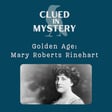
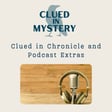
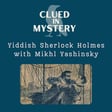
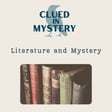
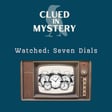
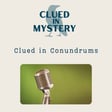
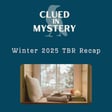
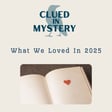
![[Re-release] Anthony Berkeley image](https://media.zencastr.com/cdn-cgi/image/width=112,quality=85/image-files/61e1c276e3ec42007857cff9/e7c778ac-a2ba-4809-9a5c-7cd39d167834.jpg)
![[Bonus] Wake Up Dead Man image](https://media.zencastr.com/cdn-cgi/image/width=112,quality=85/image-files/61e1c276e3ec42007857cff9/e276ac32-e664-464f-956c-7699bdb60aa5.jpg)
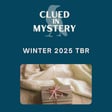
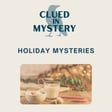
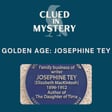
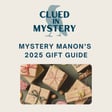
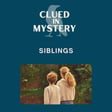

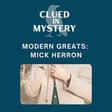
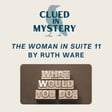
![[Bonus] Read Along: Daughter of Time image](https://media.zencastr.com/cdn-cgi/image/width=112,quality=85/image-files/61e1c276e3ec42007857cff9/b953ad72-c43e-48ca-a18a-b3c216ab90ee.jpg)
